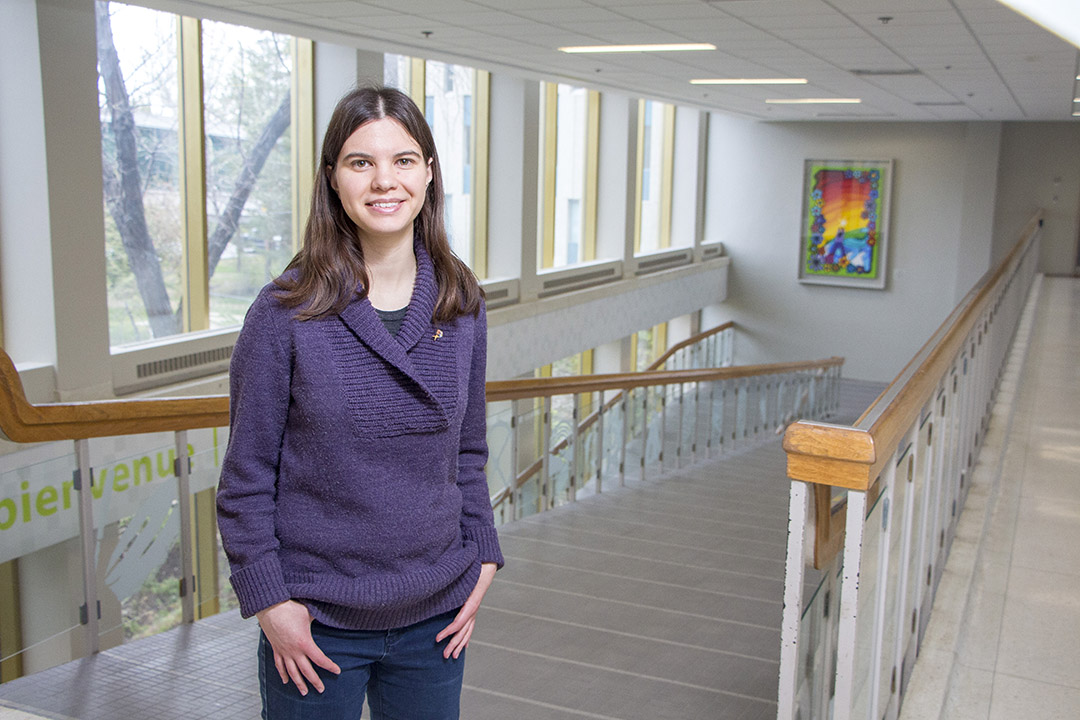
From udon noodles to online data: Computer science student excels in diverse areas
Janelle Berscheid always liked computers, video games and technology as a child, but she never considered computer science to be a career option.
By Shannon BoklaschukThat all changed when she took a 100-level computer science course at the University of Saskatchewan “out of curiosity” during her first year of studies.
“I was instantly hooked. I’ve always loved problem solving, and this class was just the perfect blend of creative thinking, logic and design,” she said. “After that year, I left to go teach English in Japan, but I did a lot of self-study in programming while I was abroad and eventually got involved in local Japanese game development communities. When I came back to the U of S to finally get my degree, computer science was the obvious choice.”
Since then, Berscheid has excelled in her studies at the College of Arts and Science; for example, she was named to the Dean’s List and received a Natural Sciences and Engineering Research Council of Canada (NSERC) Undergraduate Student Research Award (USRA). As a result, she had the opportunity to work with Professor Regan Mandryk—an acclaimed U of S researcher who recently received a prestigious E.W.R. Steacie Memorial Fellowship from NSERC—in the college’s Human-Computer Interaction Lab.
“My project was to collect data from participants who play games online, and try to use machine learning to develop a mental health assessment model to distinguish healthy players from those who are depressed or at risk for depression,” said Berscheid. “The hypothesis was that depressed players may exhibit detectable patterns of interaction while playing games and interacting with the gaming community.”
Berscheid said the mental health project provided her with a lot of hands-on experience “with ‘data wrangling’ in the wild.”
“Unlike in classes on data analysis where all the data is just perfectly arranged so you can do the assignments and learn something, data you collect from online can be quite messy; the service we used yielded especially gnarly collections of information that I had to convert and clean so it was actually usable,” she said.
“I also learned a lot about feature engineering—distilling large amounts of data into a few highly descriptive values—and the tenacity you need to undertake a machine learning project.”
Berscheid’s hard work will soon pay off, as she’s set to receive her Bachelor of Science (honours) degree in computer science during U of S Spring Convocation at TCU Place on June 5. In the fall, she will begin graduate studies in computer science in the College of Arts and Science.
Currently, she’s working with Professor Kevin Stanley, the head of the college’s Department of Computer Science, on Team INTERACT, a national research initiative exploring the link between urban infrastructure and public health.
“Our team is using smartphone and sensor data to examine how infrastructure projects in cities across Canada—such as new bike lanes in Victoria or the upcoming BRT lines in Saskatoon—affect residents’ physical activity, social connection and wellbeing,” Berscheid said.
“I’m currently doing research on methods of imputing GPS trajectories from sparse data, as well as building tools for handling and analyzing the incoming study data. This is challenging because the sensor data is ‘big data,’ with a high volume and velocity; traditional methods of accessing data break down when you need to examine hundreds of billions of data points.”
Berscheid credits her ability to be a “self-sufficient” learner to the eight years she lived in Japan, where she taught English and worked as an udon noodle maker. While there, she learned enough Japanese to function in “a zero-English environment” and also learned how to navigate culture shock and misunderstandings and communicate across language barriers.
“I still employ those same language learning techniques in my non-language classes here, which helped me move through material really efficiently,” she said.
While Berscheid became proficient at making udon noodles at a shop in Japan, it’s a task she no longer undertakes now that she’s back in Saskatchewan.
“Proper udon noodles have only three ingredients—wheat flour, salt and water—which are kneaded together into a stiff dough and then fermented in stages to achieve the correct texture. This makes the dough very sensitive to climate; the ambient temperature and humidity change how the noodles turn out,” she said.
“In the shop, we would use different proportions of salt and water in the dough depending on the season—the recipe changed significantly between summer and winter. In Saskatchewan, we have a much drier climate than Japan, as well as more extreme temperatures, so the noodles won’t ferment the same way. Getting the proportions of ingredients, fermenting time and temperature right for Saskatchewan will take a lot of experimentation across seasons—and probably special equipment.”
As an undergraduate student, Berscheid has explored a number of other interests; for example, she is an organizer of September’s Med.Hack(+) hackathon event. She also entered the Great Canadian Sales Competition—Canada’s biggest student competition—“on a total whim” and did very well, landing a spot in the Top 50 out of more than 3,600 participants across the country. In addition, she is a self-described “huge public speaking enthusiast” who wants to further hone her skills in this area.
As for her future aspirations, Berscheid wants to specialize in artificial intelligence and machine learning and find ways to pass on that knowledge to others.
“I’m also interested in tinkering more with my learning processes themselves. The field is moving so fast that being able to learn more efficiently will help me engage with it more deeply,” she said.
“I want to use my skills handling data to make the world a better place somehow, not a worse one. There isn’t a particular research lab or company I want to work for right now; I just want the nature of the work to be challenging, fascinating and positive.”

